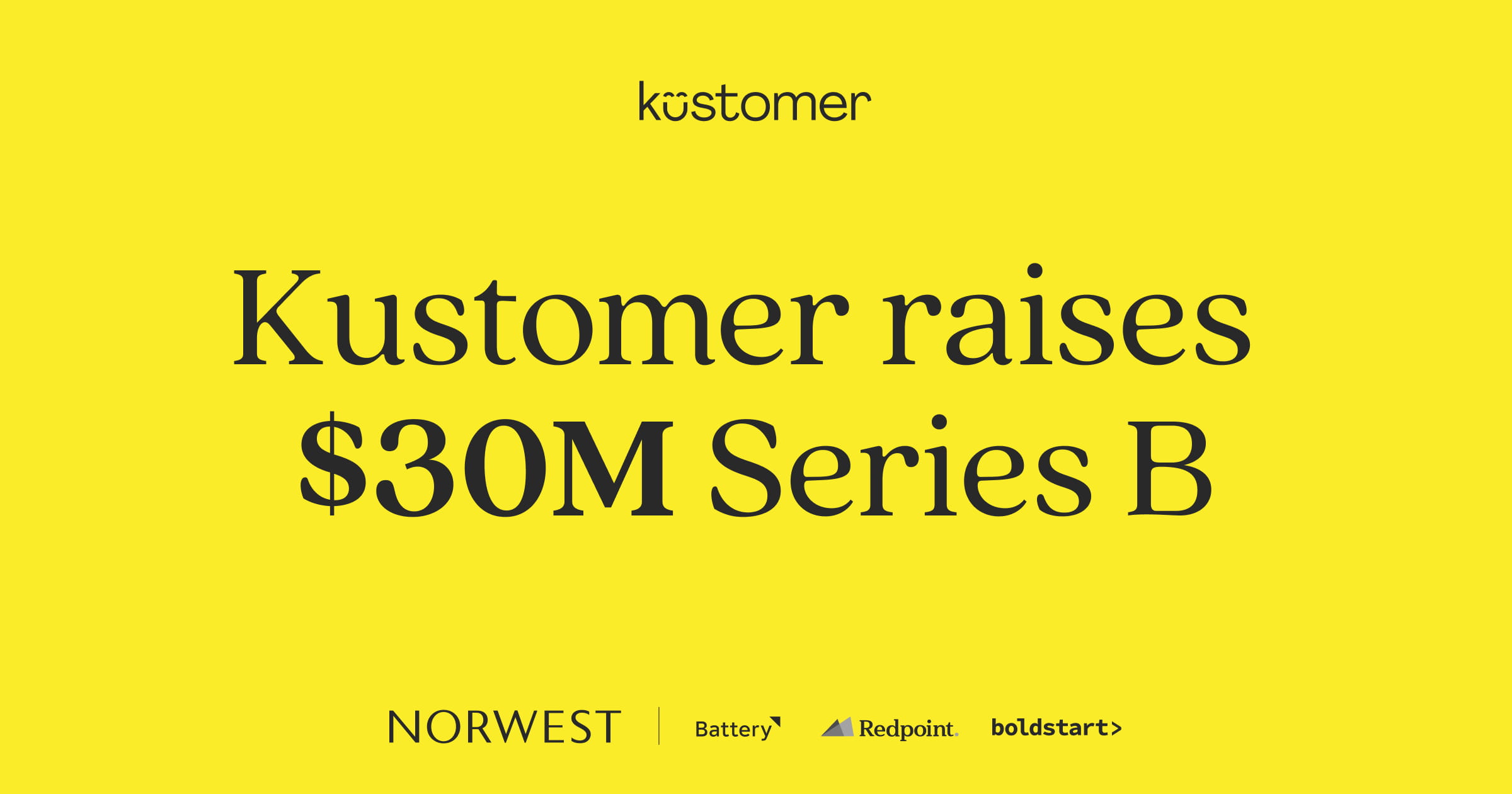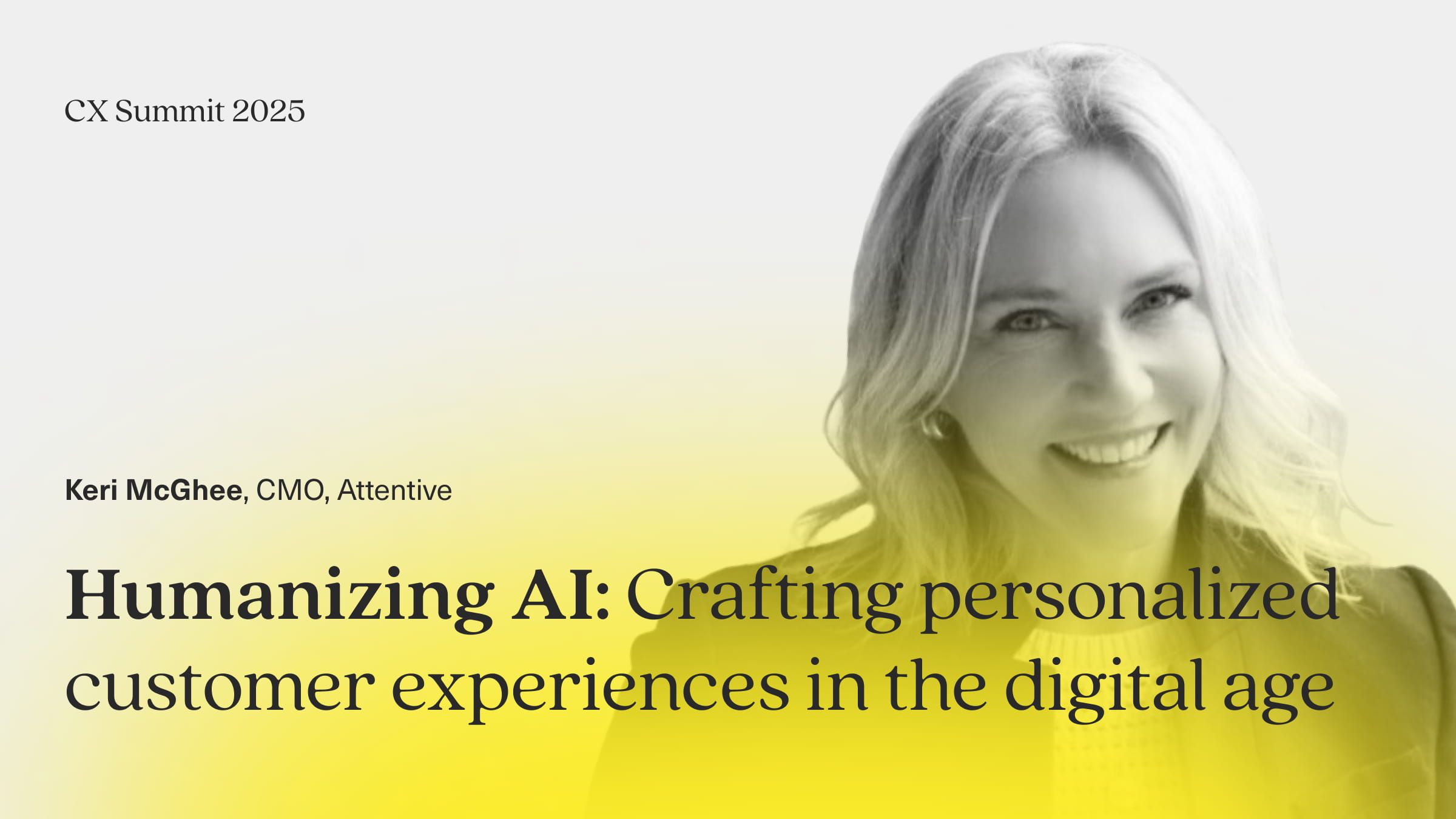Keri McGhee, Chief Marketing Officer at Attentive, joined us at the CX Summit to share her perspective on how customer relationships are evolving in the age of AI. She and Carly Horn, Director of Partner Marketing at Kustomer, discussed the critical role of personalization, the growing importance of trust, and how brands can use new technologies like RCS to create seamless, high-value experiences.
Dig in to her expert advice:
This interview has been edited for clarity.
Carly Horn: What has changed the most in how brands think about customer relationships over the last decade?
Keri McGhee: I think the biggest thing, and any of us who have been in marketing for a while have heard this, is personalization. It has mattered for decades, but until recently it was really batch and blast. It was one-to-many, sending a somewhat segmented personalized message, but essentially everyone got the same thing.
Now, through the innovation of AI and real-time updates on a shopper's history and behavior, we are finally able to truly speak to the customer like we know them, because we actually have the data. That is one of the biggest innovations in marketing, in my opinion. You can talk to someone like you know them, in the brand voice, at scale.
Another big shift is customer advocacy. Brands are realizing they really have to build relationships with customers. Marketing today is about making sure brands know you understand their customer challenges and are building tools to help solve them. Building trust early is critical.
And finally, user-generated content. Ten years ago, it was not something brands leveraged at scale. Now, it is a major investment because consumers make decisions based on trust. Reviews, authentic experiences, and content created by users have become an essential part of the shopping journey and experience.
Carly Horn: Absolutely. We talk about trust a lot at Kustomer, and it is so important, especially in customer service. Building trust is incredibly valuable. Let us talk a little about Attentive. We are discussing personalized communication at scale. What does personalization actually look like, and how does it evolve as customers start to adopt AI?
Keri McGhee: When brands start thinking about adopting AI, it is important to remember that consumers do not really care whether AI is involved. We recently did a survey where over 90 percent of consumers said they are willing to share their data if you treat them like you know them.
Personalization has evolved because AI makes it possible at scale. You cannot possibly build enough segmented lists manually to truly personalize communication for every customer. AI layers over your data warehouse and subscriber IDs, pulling from all available data to deliver highly personalized messaging.
It allows brands to have real-time, by-the-second updates and activate that data immediately. The right message, at the right time, in the right brand voice, when the customer is ready to buy, is a real game changer.
Carly Horn: Yes, and the brand voice has come up a lot in the sessions we have had. We are thinking across different channels too, not just those Attentive serves, but also customer service channels. Making sure the brand feels consistent, whether you are buying on a website, in-store, or through Amazon, is so important. We have been talking about that with our BPO and support partners.
Keri McGhee: Consumers can tell the difference. They know if it is a bot speaking to them or not. AI now allows us to emulate a much more natural and trustworthy experience, even if the customer is speaking with AI.
Carly Horn: That is a good segue. How should brands be thinking about building trust with customers in an era where every message could be generated? We hear from brands who are still hesitant to use AI in customer service because they worry it will lose that human touch.
Keri McGhee: AI is only as good as the data it is based on. Brands need to make sure their product catalog and customer data are solid. As companies mature in how they manage data, AI can actually learn from the conversations you are already having with customers.
We are seeing that most of the time, AI wins when put head-to-head against human-only conversations. But you have to test into it. For brands that are hesitant, it is important to start small, test, and build confidence. Humans still play an important role monitoring and ensuring the experience stays aligned with the brand voice.
You need to balance speed and authenticity, get it right in small tests, and then scale up once you are confident.
Carly Horn: Exactly. It allows the humans to handle the more complex, higher-value interactions. AI takes care of the basic ones, which is better for both the customer and the brand.
Let us talk about outcomes. Can you share an example where personalized messaging led to a breakthrough moment for a brand, whether it was around revenue, loyalty, or reengagement?
Keri McGhee: Sure. One brand we work with, a female-led business that offers a lot of customizable gifts like bags and boots, really pushed into personalized messaging. They used both SMS and email, focusing on send time optimization.
Their audience is busy — families juggling sports, activities, and more — so timing mattered. After adjusting for send time, they saw a 97 percent boost in revenue and over 25 percent lift in conversion. Per message, they saw over a 20 percent lift, which was transformative for their revenue.
Carly Horn: That is amazing. Anyone hearing that would want to be doing it.
Keri McGhee: It comes down to testing. You have to test the right product, the right segment, the right time. Consumers are quick to abandon brands that send irrelevant messages, just as much as they will reward brands that get it right.
The innovation in AI is not just about sending the right message, but also about excluding the wrong audiences who do not want to be bothered.
Carly Horn: Absolutely. And it is about how they want to be communicated with too. We are even seeing voice becoming more important again on the support side.
Meeting customers where they are, in the channels they prefer, is critical. Attentive helps unify that across email, SMS, and more.
Keri McGhee: Exactly. Orchestration is key. Understanding preferences across channels and optimizing for them adds a lot of value, and AI plays a huge role in making that orchestration possible.
Carly Horn: I know you mentioned RCS earlier. Some listeners might not know what that is. Can you define it and explain how a brand might use it to create a personalized experience?
Keri McGhee: Sure. RCS stands for Rich Communication Services. It has been used internationally for a while, and now it is rolling out more widely in the US with recent updates from Apple and Google.
RCS allows rich experiences directly in the messaging app — carousels, videos, GIFs, and much larger file types than MMS. It feels like a mini app within your messaging thread.
We are live with brands like FragranceNet and Crocs, and the feedback has been incredible. Seeing a verified brand logo in your message inbox builds trust. Consumers can scroll through products, interact with multiple choice options, and reference past conversations.
It simplifies the journey, minimizing the number of clicks needed to complete an action, which is crucial when consumers have such short attention spans. Simplicity and personalization together are going to make RCS a huge unlock for brands.
Carly Horn: It is really about continuity too, right? Making it feel like one seamless conversation with the brand, not separate fragmented channels.
Keri McGhee: Yes, and simplifying the experience for consumers. Most people have very little patience. If something takes too long, they move on. RCS helps brands get customers to conversion quickly, with a more engaging, personalized experience.
Carly Horn: And you were just at a conference talking about RCS this week, right?
Keri McGhee: Yes, it was our second event with Google. First in New York, and then at their headquarters in Mountain View. We had developers and innovators sharing use cases directly with brands.
Brands are excited about the potential, especially with how RCS can help them stand out visually in a crowded messaging environment. Verizon is already live, and other carriers like T-Mobile and AT&T are launching soon. Adoption is expected to reach over 90 percent, and brands are eager to get in early.
Carly Horn: I am sure. Everyone wants to be first. Let us wrap up. Any key takeaway or leave-behind for the audience?
Keri McGhee: The biggest thing is to stay agile. We are in a time of uncertainty with consumer spending, and brands that lean into AI to create real-time, high-value interactions are the ones winning.
If you are hesitant, or your leadership team wants to wait and see, you are already behind. Dive in, test something small, and find ways to improve the customer journey now. Over 90 percent of consumers are willing to give you their information if you use it to create value.
Focus on building trust, acting in real time, and using personalization to create those high-value moments.
Closing thoughts
Keri McGhee emphasized that personalization, trust, and real-time engagement are now critical for brands to succeed. AI has unlocked the ability to treat customers like individuals at scale, and brands that embrace testing, agility, and innovation are seeing major gains in revenue and loyalty. Technologies like RCS and AI-driven orchestration are shaping the next era of customer communication. The takeaway is clear: brands must act now to create seamless, high-value experiences or risk falling behind.
Ready to take the next step in your brand’s customer experience with AI? Check out our guide on how to best leverage AI Agents so you can get ready to implement them for your brand.
Chat with our team to see what Kustomer’s comprehensive AI-powered CRM and customer support tool can do for you.




